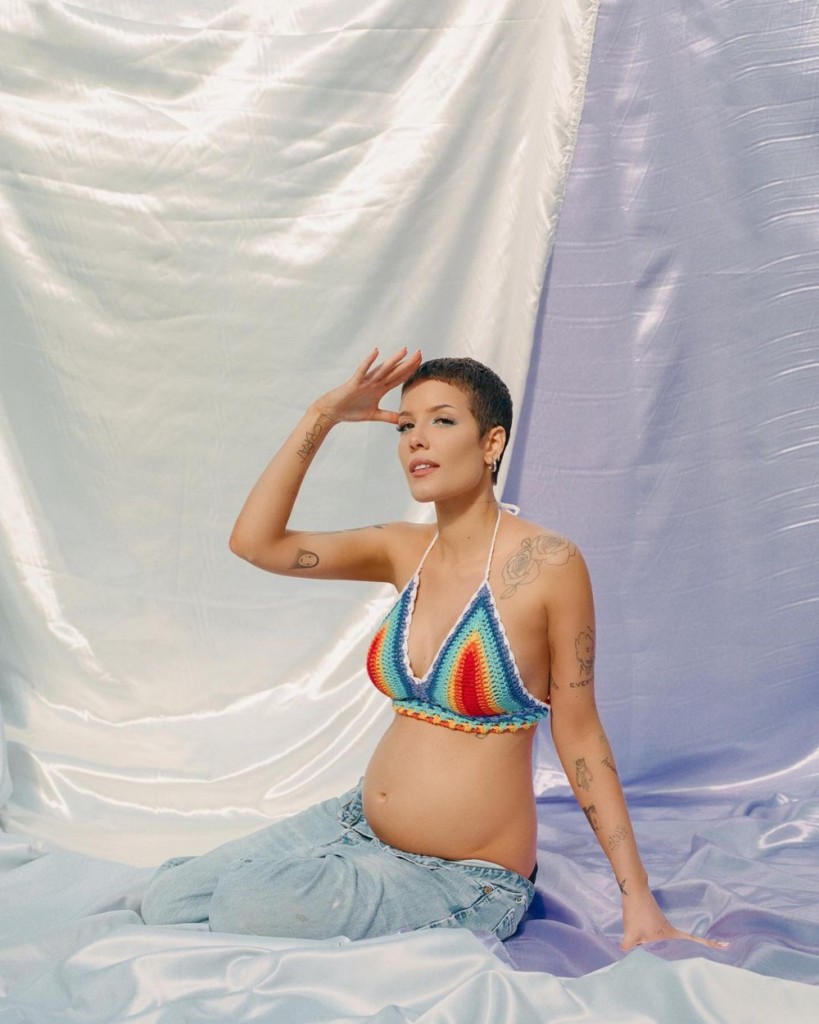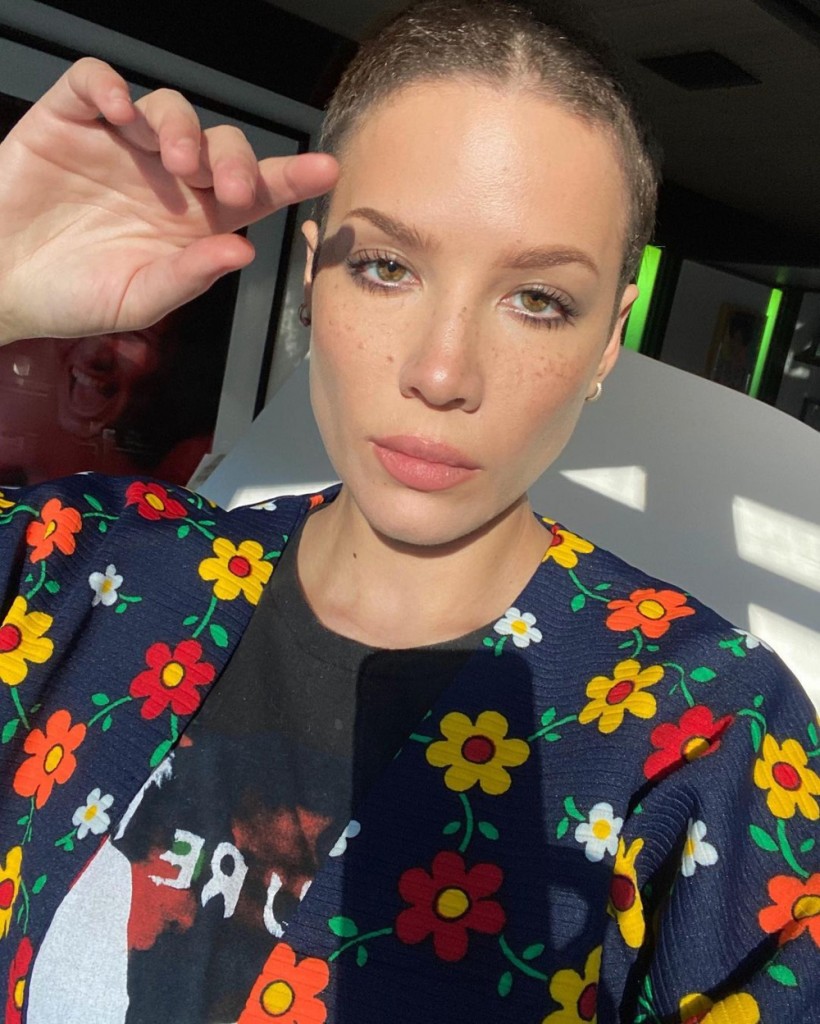Halsey and boyfriend Alev Aydin announced last January they were expecting a baby. In February, Halsey wrote some oninteresting insights on gender identity. Halsey said that they had assumed becoming pregnant would give them, “very strong, binary feelings about “womanhood,” but in reality it had “leveled my perception of gender entirely. My sensitivity to my body has made me hyper aware of my humanness and that’s all.” I found their comments fascinating and appreciated that they were sharing their journey with us. Recently, Halsey changed their pronouns on both their IG and Twitter accounts to she/they. They made no formal announcement, but their fans noticed and fully embraced Halsey. When Halsey saw all the love they’d received and how many people they’d inspired, they thanked fans – simply, sincerely and sweetly.
Halsey is thanking fans for support after updating their pronouns on social media.
In a Saturday Instagram Story post, as shared by multiple outlets includingYahoo! and Teen Vogue, the 26-year-old singer showed their appreciation with a simple “Thank u,” followed by a red heart emoji.
While Halsey did not specify what they were posting about, fans noticed that the singer changed their pronouns to she/they on both Twitter and Instagram.
Many flocked to social media to show their support for the “Without Me” hitmaker, with one writing, “Seeing halsey change her pronouns to she/theyand seeing people be so so happy that they share pronouns with someone who is so important to them and holds so much influence is so🥺🥺🥺🥺 u all are so valid I’m so proud of u :,).”
Tweeted another, “Halsey using she/they pronouns really warms my heart. people do not understand how easily u can make someone feel invalidated just with simple words. Seeing a person i look up to a lot coming out with the same pronouns as [me] is very comforting tbh <3."
This story is really affecting me for some reason. Here’s Halsey, who has gone through a very emotional reproductive journey that’s turning out to be much happier this time around. They’re having this personal enlightenment in the process that’s allowing them to further define themselves. And in doing so, because of the platform they have, they have allowed others to feel seen and validated. I’m so happy for everyone. And yet another beautiful reminder of how important representation is for everyone.
Photo credit: Instagram


















Genuine question: If Halsey is She/They, is it improper to say “She did this activity” vs “They did this activity”? Or are they interchangeable and fluid? Versus being They/them or She/Her…
I have this question too! I’ve only seen she/hers or they/theirs up until this week when a co-worker also switched pronouns to she/they. Does it mean the person identifies as a woman but prefers to use a gender-neutral pronoun out of solidarity? Or that the person is OK with either the gendered or the neutral pronoun, the user can choose? This question is coming from a place of genuinely good intent, I don’t want to inadvertently show disrespect by getting it wrong.
Drea and Lionel, you may find this resource handy 🙂
https://www.mypronouns.org/how
Thank you Darbie10! For others, that particular page didn’t answer the specific question about “she/they” but links to a number of great resources.
I tried to research it myself and consensus seems to be that “she/they” indicates a person who experiences some degree of gender fluidity, but does not identify as entirely non-binary or non-gendered and falls closer to the female than male end of the spectrum. So this person likely prefers “she/hers” and generally identifies as more female than not, but at times may prefer “they/theirs.” (Or is fine with anyone using “they/theirs” to refer to them.) The converse “they/she” indicates a person who identifies as more fluid or non-binary or non-gendered than female, and therefore usually prefers “they,” but also falls somewhere on the spectrum closer to female than male and therefore doesn’t feel completely misgendered if someone uses “she/hers” to refer to them. (Or would prefer to be referred to as female rather than male if forced into a binary construct.)
I am an old she/hers and this was just a Google search, so I do not speak from experience or deep knowledge. I invite anyone correct me or to add more context.
Same question here. I notice that the author only uses “they” in the article, but am not sure if that is just to err on the safe side. It would seem that if Halsey chaned their prouns to she/they, that for us to use “she” would be ok, but I also worry that there may be an aspect that I am unaware of.
I also have a further question. If a person (in this case it’s Halsey- but I am trying to understand this scenario for other people as well) was assigned female at birth, and has gone by “she/her” for most of their life, what does it mean when they change to “she/they”? I understand when someone is assigned female at birth and changes to “he/him” or “they/them”. But I find she/they confusing as they are still partially acknowledging the gender assigned at birth.
Honestly, when I don’t understand I just do what the person wants anyway, as that is the right thing to do. And I know people don’t owe ME an explanation of their preferred pronouns. I just find that it can be helpful to understand the whys.
I would think it’s OK to say she (if *she* allows it), but if you use they, it’s clear that you’re supportive of their new identity, while if you use she, it could be all from not knowing her identity, to a random pick, to being hostile and using “she” because you absolutely refuse to call them they.
That is a good point Nanny, using “they” is more obv supportive. Also, after seeing Not SoNew New York’s response below, I think I have to remind myself that there is not neccessarily a “universal why”- we are talking about individual people and while some may have similar experiences, it may not be true for all.
i used to think being trans meant one straightforward thing, but as more info came out about trans people, and non binary people and being gender fluid it became clear that it can be very confusing, but really it comes down to “it’s not one size fits all”, and take your cue from each person on what they want to be called. I think I always want to understand, but no one owes me that explanation. i do owe others the basic courtesy of using their chosen pronouns though.
I’ve always thought of it as being gender neutral as a person, but content in a female-presenting body. Or if they are he/they, being gender neutral personally but content in a male-presenting body. As opposed to gender neutral people who prefer an androgynous bodily presentation (they/them).
Darbie, I get the pronouns as a whole. It’s the mixed pronouns that aren’t clear to me. On top of the unclear grammar, like she/they. She/them would make more sense to me from a subject/object grammar perspective, but she/they are both subject pronouns. But I digress.
So, my question, I guess, is part grammar, part if it truly is she/they, does either pronoun work at any time? And now I realize each and any person will likely have a different response to this, and I should just ask.
I too have had this question! I’ve avoided seeking clarity because it would probably be online and I was afraid of coming off as combative!
Some genderqueer or nonbinary people experience multiple distinct genders. I’m one of them– so some days I am male, some days female, some days something in-between/neither. It’s not a game, its a bone-deep embodied experience of the self and of the self in the world. I use they exclusively, but some of my friends who experience their gender similarly like to use she/they because they are strongly identified with their female identity that they still regularly experience, so feel comfortable with she, but also have this other non-female side of them, so they is also appropriate. Not saying this is Halsey’s experience, just putting it out there as a data point.
This is a great share. Thank you.
@NSNNY: I second Drea’s post! Very helpful and I thank you for sharing.
I think I will just go with Me/Here as my designation. It’s basic and factual until I leave this sphere of existence.